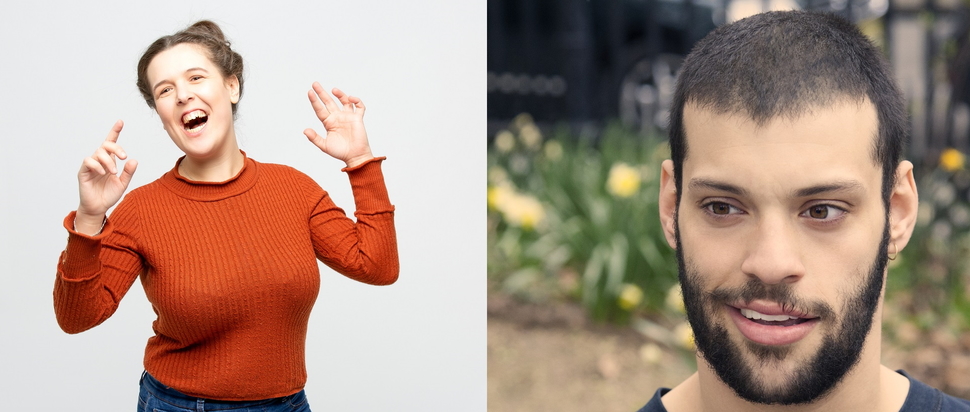Tim Renkow and Rosie Jones on accessibility in comedy
Ahead of Glasgow Comedy Festival, we speak with comics Tim Renkow and Rosie Jones about accessibility in the comedy industry
Rosie Jones and Tim Renkow may have very different comedy styles, but both share a delight in subverting cultural expectations of disability, while insisting upon their reality as flawed human beings. Jones introduces herself as ‘a triple threat’, proclaiming gleefully: “I’m disabled, I’m gay and I’m a prick.” Tim Renkow, in a wry reference to the effects of his cerebral palsy, is a self-styled ‘jerk’, and in his BBC Three show of the same name, he exploits his disability to get away with all manner of bad behaviour.
For both comedians, the cultural representation of people with disabilities is improving, albeit very slowly. Both agree that we are still in the early stages of the development of disabled civil rights, and given that disability is something many able-bodied people have very little experience of a basic level of exposure is still required. Jones points to the 2012 Paralympics as a watershed moment when disability was granted visibility and started being seen in a more positive way, less something “people couldn’t understand” or “to be pitied or patronised.” And Lee Ridley’s success on Britain's Got Talent in 2018 was also “massive”. For many, “the first disabled person they’d seen on TV.”
Beyond mere exposure, both instances also showcased undeniable skill and Renkow suggests that comedy specifically is “a good shorthand” for broadcasting a simple statement; “I’m clever... clever enough to make a well-crafted joke,” he says. Furthermore, comedy also offers a way of performing a certain resilience or robustness, which counters preconceptions of fragility and defies the conventional narrative of disability as tragic or traumatic.
However, we should be wary of situating comedy as the crucible of cultural change, given how slow moving it is as an industry. Jones describes the laborious process of getting to ‘known’ status and how “we won’t see the ripples of, say, me or Lee Ridley for a few years yet.” Stand-up also has a notorious issue with inaccessible venues – a topic which exasperates Jones, who describes the persistence of the lack of accessibility as “staggering”. Renkow is more sanguine, however; “Stand-up is a guerrilla artform,” and perhaps not much can be done without destroying that ad hoc quality. He cites a statistic that only 40% of Edinburgh’s venues are accessible – and argues that “for the way that city is built, that’s quite impressive. People are trying.”
Both comedians are nervous about being role models. Up until now, Jones has embraced it fully and says that it makes her so happy if she’s able to inspire other disabled people. That quest is partly what fuels her extraordinary work ethic – the panel shows, the podcasts, the TV writing, the stand-up – as she grasps every opportunity that comes her way. “[It] gets a bit heavy for me,” she says. “I worry that when I am on TV or radio I have to speak for all disabled people, and that is such a daunting thing because I don’t speak for all disabled people, I speak for me.” Her upcoming BBC Radio 4 series, Rosie Jones, Boxticker – out in April – explores precisely the impossibility of representing “all disabled people, all women, all gay people.”
Studiedly less high-profile, Renkow echoes her concern about being representative, and clearly has little appetite for the same degree of cultural engagement. He’s enjoying the recognition though, to a degree. The only real downside is the difficulty in judging the right response to people who address him on the street. Is it ‘thank you, glad you like my work’ or ‘no, I’m not homeless and I don’t need the change’?
Both comedians are clearly pleased by their deserved success. Renkow, with a new series of Jerk just starting rehearsals, says with some perplexity, “I keep setting myself goals that I feel are too ambitious and then I keep achieving them.” While Jones’ enthusiasm and joy is a delight to behold. “I’m living my dream,” she says.
While clearly there’s much more to be done in order to reach the point where disability is a social irrelevance, there are glimpses of it here and there, and Jones mentions the relief of a recent panel show when her disability was barely referenced, because “it just wasn’t relevant”. The ultimate dream.
Five more comedy festivals we're looking forward to
Melbourne International Comedy Festival
Like the Edinburgh Fringe but with more predictable weather; featuring Oliver Coleman, Mawaan Rizwan, Jessica Fostekew. 25 Mar-19 Apr
Machynlleth Comedy Festival
Said 'Ma-cunt-lith'... you heard; featuring AMusical, Beth Vyse, Jain Edwards. 1-3 May
Brighton Fringe
Sorry to disappoint you, the beach is full of pebbles; featuring Evelyn Mok, Tues Night @ Social Club. 1-31 May
Latitude
Excellent music line-up AND always excellent comedy line-up; featuring Simon Amstell, Flo and Joan, Kerry Godliman. 16-19 Jul, Henham Park, Suffolk.
Leith Comedy Festival
Brand new for this year, so line-up TBC. 23-25 Oct
Tim Renkow Tries to Punch Down, Tron Theatre, Glasgow, 28 Mar, 9pm, £8-11; Jerk is currently available to watch on BBC iPlayer
Rosie Jones: Backward, Blackfriars Basement, 15 Mar, Glasgow; Rosie Jones' Box Ticker Radio 4 show will be available to listen to from April
